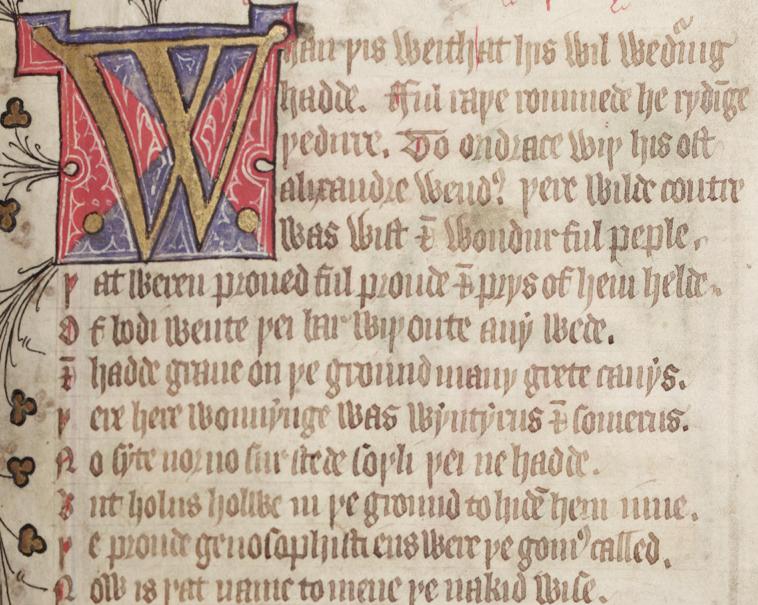In this extract from the beginning of Alexander and Dindimus, we are introduced to the strange land that Alexander is visiting:
Click here to listen (Read by Prof. Ad Putter)
Transcribed text: Whan þis weith at his wil weduring / hadde. Fful raþe rommede he rydinge / þedirre. To oridrace wiþ his ost / alixandre wendus þere wilde contre / was wist & wondurful peple. / þat weren proued ful proude & prys of hem helde. / Of bodi wente þei bar wiþoute any wede. / & hadde graue on þe ground many grete cauys. / Þere here wonnynge was wyntyrus & somerus. / No syte nor no sur stede soþli þei ne hadde. / But holus holwe in þe ground to hiden hem inne. / Þe proude genosophistiens were þe gomus called / Now is þat name to mene þe nakid wise.Modern English Translation: When this man had the weather he wanted, he very soon roamed thither, riding. With his army, Alexander travelled to Oridrace, where wild lands were known of, and extraordinary people who were known to be very proud and thought much of themselves. They lived bare-bodied, without any clothes, and had dug in the ground many large caves where they lived, winter and summer. Truly, they had no city nor safe place, but hollow holes in the ground to hide themselves in. The people were called the proud Genophistians; and that name means ‘nakedly’.
Note: In our transcription, / indicates a line-break in the manuscript, and letters in italics are expanded from abbreviations used by the scribe to save time and space.
If you listen carefully, you can also hear that in our recording we have changed one of the words in this extract. That’s because as it stands in the manuscript, one of these lines doesn’t fit with the usual ‘rules’ of writing alliterative poetry in this period. But if you swap the word written in the manuscript with another word that means the same thing, the rules about how the line has to sound are satisfied.
Click here to follow the story of this manuscript.
(Images reproduced by kind permission of the Bodleian Library, University of Oxford
http://image.ox.ac.uk/show-all-openings?collection=bodleian&manuscript=msbodl264)

